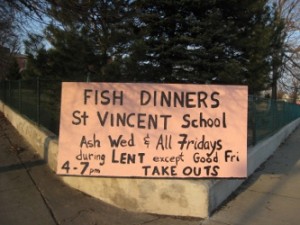
The fish frys at St. Vincent De Paul church are one way voters connect with candidates and elected officials on a frequent basis. (Brian Hayden)
On a Friday in Lent, Assemblyman Bill Magnarelli stopped to pick up two take-out, fish-fry dinners at St. Vincent DePaul’s parish hall for himself and his wife, Karen.
“I’m not here to campaign,” said Magnarelli, D-Syracuse. “I’m here to eat.”
Still, as he picked up his dinners, Magnarelli stopped to chat with several of his constituents, who feasted on the fried fish in the parish hall.
Church meals and fundraisers like fish frys, spaghetti dinners and pancake breakfasts connect voters to each other, say politicians, church officials and experts on politics. They strengthen communities and give elected officials and candidates a chance to meet and greet their constituents. Each event weaves itself into the larger political fabric of Central New York.
Ann Marie Buerkle, who is seeking the Republican nomination for the 25th Congressional District, describes church functions as a great way to meet voters. Buerkle, 58, stopped at many local churches when campaigning as a common councilor at large in 1994. She lost that race. But for this year’s Congressional race, she’ll be back at the church dinners and breakfasts to talk to potential voters.
“They’re sitting down. They’re comfortable,” Buerkle said. “It’s just a good opportunity to talk and meet with people.”
The Rev. Linus DeSantis, chaplain of the Alibrandi Catholic Center at Syracuse University, credits the casualness of the church meals with creating a good mood for enriching conversations. “If you’re at a pancake breakfast with syrup on your fingers, you’re not about to pull out your pen and paper and say ‘What’s this candidate thinking?’” he said. “If we’re more relaxed, we’re more willing to take things in.”
These functions are among the enduring social and political rituals, said Robert McClure, the Chapple Family Professor of Citizenship and Democracy at Syracuse University. Such gatherings mean more than campaigning or garnering votes for politicians. “These gatherings are crucial to reminding us of our connectedness,” McClure said.
As society has grown more individualistic, McClure said, these events have become more important for politicians to get a feel for the communities in their district. “For a community to have meaning and tug at you,” he said, “it’s got to be something you participate in.”
For Onondaga County Legislator Tom Buckel, D-Syracuse, voters and politicians both benefit from the social functions at churches and other community organizations. He visits between 20 and 25 such functions a year, Buckel said.
They help build trust between the electors and elected, he said. “There’s always that practical aspect,” said Buckel, “of people seeing you engaged in their lives.”
The best known of Syracuse’s ritual meals is the annual Election Day pasta dinner at our Lady of Pompeii Church on the city’s North Side. Every election, it draws candidates and voters in droves.
“Everyone breaks bread together,” said Eric Rosenthal, one of the pasta dinner’s organizers. “And the plentiful handshakes and hugs are in the name of supporting are parish and school.”
At St. Vincent DePaul’s parish hall, Assemblyman Magnarelli is on his home turf as he picks up his fish-fry dinners. Magnarelli grew up nearby. Some of his wife’s relatives attend St. Vincent De Paul.
“These are people I have known all my life,” Magnarelli said. “It’s good to break bread with them every once in awhile.”
(Brian Hayden is a senior majoring in newspaper journalism.)
-30-


